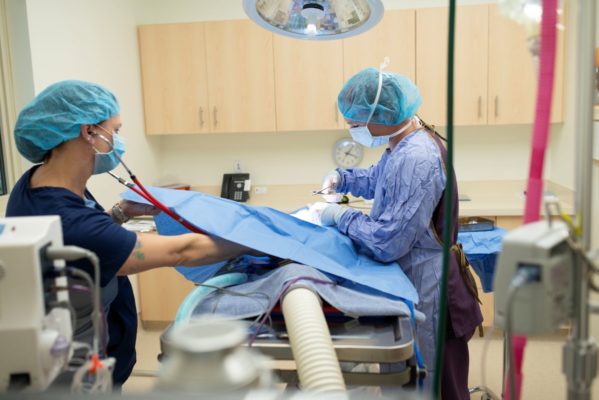 We perform many types of soft tissue surgeries at our clinic. Soft tissue surgeries are those that are not associated with bone. The most common soft tissue surgeries that Oconomowoc Animal Hospital performs are : tumor removals, cystotomies, abdominal exploratories, enterotomies (in case of foreign body), entropion and eyelid tumor removals. For more information about ovariohysterectomy and castration, please read “Ovariohysterectomy” and “Castration” under Surgical Services.
We perform many types of soft tissue surgeries at our clinic. Soft tissue surgeries are those that are not associated with bone. The most common soft tissue surgeries that Oconomowoc Animal Hospital performs are : tumor removals, cystotomies, abdominal exploratories, enterotomies (in case of foreign body), entropion and eyelid tumor removals. For more information about ovariohysterectomy and castration, please read “Ovariohysterectomy” and “Castration” under Surgical Services.
Probably the most common soft tissue surgery performed on pets is the removal of masses, or lumps. Some of these masses, once removed and tested, are found to be benign (nonharmful); however, occasionally they are more serious. Early removal and accurate diagnosis of a mass is necessary to improve the outcome in your pet if the mass is cancerous.
The most immediate concern for a pet with bladder stones is that the urinary opening may get obstructed as the animal attempts to pass the stones; this is largely a problem with male dogs or cats, but the results can be life-threatening uremic poisoning or bladder rupture. In such cases, the veterinarian will try to dislodge the stone, flushing it back into the bladder until surgery can be performed.
Bladder stones are irritating to the bladder simply by rubbing on the tender lining. Bleeding, chronic bladder infections, and urinary frequency/accidents due to pain and discomfort. Oconomowoc Animal Hospital then sends the stones out to a laboratory to have the stone analyzed. This helps our veterinarians determine which prescription diet will work best for your pet to prevent any future bladder stones.
There are many reasons your pet may need a surgical abdominal exploratory. Sometimes pets eat things that they shouldn’t (socks, corn on the cob, rocks, rubberbands, etc) and get a gastrointestinal obstruction. To remove these gastrointestinal foreign bodies an incision is made in the intestines at the sight of the obstruction. This procedure is call an enterotomy. The foreign body is removed and the intestines are surgically repaired.
Another reason your pet may need a surgical abdominal exploratory is to do a general exam of your pet’s entire abdomen. This includes looking at the stomach, intestines and colon in their entirety, a gross exam of the liver, spleen, kidneys, bladder, abdominal lymphnodes and the omentum. If abnormal areas are seen, a surgical biopsy can be done. These samples are then sent to a histopathologist for evaluation. The histopathologist can give our veterinarians can give us useful information (inflammatory vs cancerous cells, etc) in order for us to recommend additional treatments, if needed.
Surgery can also help resolve several problems related to the eyes. Tearing in your pet’s eyes can mean an infection is present or may be a sign that the cornea (outer layer of the eye) has been damaged. Surgery may allow the cornea to heal faster with less scarring, improving your pet’s ability to see. In some pets, the eyelashes may actually damage the cornea. Surgical intervention improves comfort in these pets, reduces the chances of corneal scarring, and enhances the pet’s vision in the long term.
Surgical eyelid tumor removals are also performed at Oconomowoc Animal Hospital. Sometimes dogs and cats develop tumors on their eyelid. These tumors can be irritating to the cornea if they are rubbing. When the animal rubs, it can cause the tumor to break open and bleed. Even if an eyelid tumor is not causing the animal a problem, the look of it can be bothersome to pet owners. These tumors can be surgically removed and once the incision is healed, the result is very cosmetic.
Please contact us if you’d like to discuss how soft tissue surgery might be able to help your pet.
